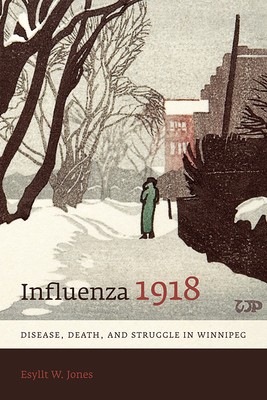
- We will send in 10–14 business days.
- Author: Esyllt W Jones
- Publisher: University of Toronto Press
- ISBN-10: 0802094392
- ISBN-13: 9780802094391
- Format: 16.9 x 22.8 x 1.7 cm, softcover
- Language: English
- SAVE -10% with code: EXTRA
Reviews
Description
The influenza pandemic of 1918-1919 killed as many as fifty million people worldwide and affected the vast majority of Canadians. Yet the pandemic, which came and left in one season, never to recur in any significant way, has remained difficult to interpret. What did it mean to live through and beyond this brief, terrible episode, and what were its long-term effects?
Influenza 1918 uses Winnipeg as a case study to show how disease articulated abd helped to re-define boundaries of social difference. Esyllt W. Jones examines the impact of the pandemic in this fragmented community, including its role in the eruption of the largest labour confrontation in Canadian history, the Winnipeg General Strike of 1919. Arguing that labour historians have largely ignored the impact of infectious disease upon the working class, Jones draws on a wide range of primary sources including mothers' allowance and orphanage case files in order to trace the pandemic's affect on the family, the public health infrastructure, and other social institutions. This study brings into focus the interrelationships between epidemic disease and working class, gender, labour, and ethnic history in Canada.
Influenza 1918 concludes that social conflict is not an inevitable outcome of epidemics, but rather of inequality and public failure to fully engage all members of the community in the fight against disease.
EXTRA 10 % discount with code: EXTRA
The promotion ends in 16d.05:39:30
The discount code is valid when purchasing from 10 €. Discounts do not stack.
- Author: Esyllt W Jones
- Publisher: University of Toronto Press
- ISBN-10: 0802094392
- ISBN-13: 9780802094391
- Format: 16.9 x 22.8 x 1.7 cm, softcover
- Language: English English
The influenza pandemic of 1918-1919 killed as many as fifty million people worldwide and affected the vast majority of Canadians. Yet the pandemic, which came and left in one season, never to recur in any significant way, has remained difficult to interpret. What did it mean to live through and beyond this brief, terrible episode, and what were its long-term effects?
Influenza 1918 uses Winnipeg as a case study to show how disease articulated abd helped to re-define boundaries of social difference. Esyllt W. Jones examines the impact of the pandemic in this fragmented community, including its role in the eruption of the largest labour confrontation in Canadian history, the Winnipeg General Strike of 1919. Arguing that labour historians have largely ignored the impact of infectious disease upon the working class, Jones draws on a wide range of primary sources including mothers' allowance and orphanage case files in order to trace the pandemic's affect on the family, the public health infrastructure, and other social institutions. This study brings into focus the interrelationships between epidemic disease and working class, gender, labour, and ethnic history in Canada.
Influenza 1918 concludes that social conflict is not an inevitable outcome of epidemics, but rather of inequality and public failure to fully engage all members of the community in the fight against disease.


Reviews